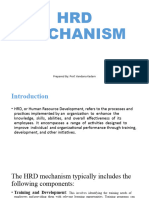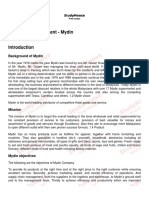67%(3)67% found this document useful (3 votes)
1K viewsBBA-Professional Communication Skills1 Case Study
BBA-Professional Communication Skills1 Case Study
Uploaded by
Sharad PatilRachana was promoted to office supervisor of the customer relations department despite being very friendly with her coworkers. As supervisor, she failed to enforce rules or check work quality, instead spending her time helping the other typists. This led to complaints about poor work and long breaks. When her boss Avishek spoke to her, she refused to discipline her friends. He will hold a seminar on separating personal and professional relationships to address the issues in the department.
Copyright:
© All Rights Reserved
Available Formats
Download as DOCX, PDF, TXT or read online from Scribd
BBA-Professional Communication Skills1 Case Study
BBA-Professional Communication Skills1 Case Study
Uploaded by
Sharad Patil67%(3)67% found this document useful (3 votes)
1K views3 pagesRachana was promoted to office supervisor of the customer relations department despite being very friendly with her coworkers. As supervisor, she failed to enforce rules or check work quality, instead spending her time helping the other typists. This led to complaints about poor work and long breaks. When her boss Avishek spoke to her, she refused to discipline her friends. He will hold a seminar on separating personal and professional relationships to address the issues in the department.
Original Description:
Case study
Original Title
BBA-Professional Communication Skills1 case study
Copyright
© © All Rights Reserved
Available Formats
DOCX, PDF, TXT or read online from Scribd
Share this document
Did you find this document useful?
Is this content inappropriate?
Rachana was promoted to office supervisor of the customer relations department despite being very friendly with her coworkers. As supervisor, she failed to enforce rules or check work quality, instead spending her time helping the other typists. This led to complaints about poor work and long breaks. When her boss Avishek spoke to her, she refused to discipline her friends. He will hold a seminar on separating personal and professional relationships to address the issues in the department.
Copyright:
© All Rights Reserved
Available Formats
Download as DOCX, PDF, TXT or read online from Scribd
Download as docx, pdf, or txt
67%(3)67% found this document useful (3 votes)
1K views3 pagesBBA-Professional Communication Skills1 Case Study
BBA-Professional Communication Skills1 Case Study
Uploaded by
Sharad PatilRachana was promoted to office supervisor of the customer relations department despite being very friendly with her coworkers. As supervisor, she failed to enforce rules or check work quality, instead spending her time helping the other typists. This led to complaints about poor work and long breaks. When her boss Avishek spoke to her, she refused to discipline her friends. He will hold a seminar on separating personal and professional relationships to address the issues in the department.
Copyright:
© All Rights Reserved
Available Formats
Download as DOCX, PDF, TXT or read online from Scribd
Download as docx, pdf, or txt
You are on page 1of 3
Professional Communication Skills – 1 Case study
The Friendly Supervisor
Avishek manages the customer relations department of a public utility
company. The department is responsible for replying to customer requests for
information and to customer complaints. There are seven typists in the
department who handle the correspondence to customers dedicated by the
staff. Avishek recently promoted Rachana to office supervisor. Rachana had
been a typist in the department for ten years. She was considered the fastest
and most accurate typist who had ever worked for Avishek. Rachana has the
best attendance record in the department and Avishek considered her his
most dependable employee. She was very well liked by all the typist and they
considered her to be a good personal friend. As a supervisor Rachana does a
good job handing out work assignments, but she does little else to supervise
the typists. She does not like to criticize the typists and does not enforce office
rules. No matter what a typists does Rachana will not take any disciplinary
action. She makes no attempt to check the work of the typists for compliance
with quality standards or to see that work is complete on time. In fact, she
spends most of her time typing to reduce the work load of other typists. The
human resource department have been receiving an increasing number of
complaints from various staff from different departments about the poor
quality of the typing and about the slow turnaround time of the work. A
number of the complaints target towards Rachana’s poor supervisory skills,
complaints were also received about the typists under Rachana taking
excessively long coffee breaks and spending time on personal phone calls. The
Human resource department convey the complaints to Avishek who has been
asked to inquire and rectify the problem. When Avishek talked to the typists,
they told him that Rachana frequently invites them to her house for dinner or
to play bridge. It appears to Avishek that the typists all like Rachana as a
friend, but they are becoming concerned about her lack of supervisory skills.
Avishek mentions to Rachana that she should focus her effort on improving
the work of the typists. She replied, “These woman are my friends and I don’t
feel right cracking down on them”.
Questions
1. Can an individual effectively manage a group and be a close personal
friend with group members?
2. What should Avishek do to ensure that the work of the typists will
improve?
3. Should Bobby have been promoted to office supervisor?
4. If you were Rachana, what would you do? Would you quit the
supervisor’s job? Would you no longer be friends with the typists?
Answers
1) No. As a manager, all relationships should be bounded and defined.
They're not about liking, chemistry, or personality. Relationships that
are personal can only produce disappointment in the long run. But it is
not impossible to maintain close personal relations with employees but
the employer must abstain from one-way authoritative directing as
giving preference to one employee can lead to disdain in minds of
others, a manager must adopt a democratic style of management to
ensure mutual respect. In the case of Rachana, her close personal
relationship with her employees proved catastrophic, the other typists
took advantage of her often taking longer breaks and becoming lax in
their work. Rachana was unable to supervise the other typists and this
lead to many complaints being put against her and the department, to
manage the group Rachana has to have a meeting with the human
resource department as well as her superior Avishek on how to handle
office and personal relationships, as well as implementing stricter rules
to ensure efficiency in work if not the only option would be a demotion
or attrition.
2) As a manager it is Avishek’s responsibility to ensure that the typists
improve their performance, and to help Rachana the supervisor, to
enforce rules. Holding a seminar on office relationships can help
Rachana to understand by ‘cracking’ down on her friends only then can
there be proper work done. The seminar can also speak to the typists
under Rachana to be aware that taking advantage of friendship within
the workplace is not ethical as it would cause problems within an
organisation.
3) Yes it was right to promote Rachana to the position of office supervisor
she has been working in the organisation for ten years and has been a
productive employee. But she lacked the ability to separate her personal
relations with her co-workers against the demand of the organisation.
4) As a supervisor it is Rachana’s duty to orient and train, assign work,
evaluate performance, approve time records and requests for time off’s,
resolve complaints and discipline employees including enforcing rules.
No, if I were in Rachana’s place I would neither quit nor cut away from
social niceties, rather I would adopt a democratic style of management
as well as a change I attitude towards employee relationships and find
balance maintaining friendly relations with co-workers as well as
looking over their work; it is unavoidable that clashes will occur with
the other typists which may potentially damage relationships.
Conclusion :
Thus, in conclusion, interpersonal skills at work directly impact the whole
organization. A strong approach to improve communication between people and
break such barriers will go a long way in assuring the efficiency of the workplace.
Cooperation with others and supporting them is very important. It improves
communication and leads to a better understand of the situation and the emotional
disposition of people.
You might also like
- Application Form Tech Nation Visa SchemeDocument6 pagesApplication Form Tech Nation Visa SchemeDushyant KashyapNo ratings yet
- Business Communication Question BankDocument7 pagesBusiness Communication Question Bankraju710@gmail.com100% (4)
- Managerial Economics Case StudyDocument1 pageManagerial Economics Case StudySharad Patil60% (5)
- Interpersonal Communication Case Study (Q&A)Document2 pagesInterpersonal Communication Case Study (Q&A)Ample Leap100% (3)
- MBA 101 Management Concepts & Applications-ImpDocument95 pagesMBA 101 Management Concepts & Applications-ImpMahendra Patil100% (1)
- Case Studies in Business CommunicationDocument3 pagesCase Studies in Business Communicationramanidhanaraj100% (8)
- Case Study, The New Manager.Document9 pagesCase Study, The New Manager.11gargdinesh767% (3)
- CLO 1 - OB and Individual Behaviour - WorksheetDocument7 pagesCLO 1 - OB and Individual Behaviour - WorksheetaishaNo ratings yet
- Communication Case Study QuestionsDocument14 pagesCommunication Case Study Questionssantosh shah100% (2)
- Two Sides of Effective Oral CommunicationDocument17 pagesTwo Sides of Effective Oral CommunicationSharath KumarNo ratings yet
- Differentiate Between HRM and HRD ConceptDocument3 pagesDifferentiate Between HRM and HRD Conceptkiran gaikwad100% (1)
- Personalitydevelopment PDFDocument35 pagesPersonalitydevelopment PDFGreeshma K S100% (1)
- Assignment 1 - Talent Management (19BBA10015)Document4 pagesAssignment 1 - Talent Management (19BBA10015)KartikNo ratings yet
- Visual Aids in CommunicationDocument5 pagesVisual Aids in CommunicationNikitha Km100% (1)
- Case StudyDocument4 pagesCase StudyLavlesh Upadhyay67% (3)
- Difference Between IHRM and Domestic HRMDocument11 pagesDifference Between IHRM and Domestic HRMvarun50% (2)
- The Puppet - Leadership CaseDocument1 pageThe Puppet - Leadership CasedaveferalNo ratings yet
- ObcasestudyDocument3 pagesObcasestudySharad PatilNo ratings yet
- HRM Case1Document3 pagesHRM Case1Sharad Patil0% (2)
- Arco Metal Products Co., Inc., Et Al. vs. Samahan NG Mga Manggagawa Sa Arco Metal NAFLUDocument1 pageArco Metal Products Co., Inc., Et Al. vs. Samahan NG Mga Manggagawa Sa Arco Metal NAFLUAnn MarieNo ratings yet
- Business Communication Case Study 1Document1 pageBusiness Communication Case Study 1shreyas100% (1)
- Reflection & EmpathyDocument20 pagesReflection & Empathyd.s100% (1)
- Difference Between HRM and HRDDocument3 pagesDifference Between HRM and HRDShubham DubeyNo ratings yet
- Effective Business Communication Case StudyDocument8 pagesEffective Business Communication Case StudyamritaNo ratings yet
- Case MC ColleaguesVsClientsDocument2 pagesCase MC ColleaguesVsClientsSri Harsha50% (2)
- Electronic Writing Process - 4Document22 pagesElectronic Writing Process - 4Anonymous Fj8TFz1rer100% (1)
- Questionnaire On Employee Retention StrategiesDocument4 pagesQuestionnaire On Employee Retention Strategiesarjun SinghNo ratings yet
- Case Study On Barriers To CommunicationDocument3 pagesCase Study On Barriers To CommunicationDivya Gill100% (1)
- Negotiation Sub Process: Perception, Cognition and EmotionDocument4 pagesNegotiation Sub Process: Perception, Cognition and EmotionArti Das100% (1)
- PCTE Group of Institutes, Ludhiana: Case Study AnalysisDocument6 pagesPCTE Group of Institutes, Ludhiana: Case Study AnalysisPrabhdeep SinghNo ratings yet
- Investment Perspective of Strategic Human Resource ManagementDocument12 pagesInvestment Perspective of Strategic Human Resource Managementከዝንብ ማር አልጠብቅምNo ratings yet
- Field Project 1st Year-1Document10 pagesField Project 1st Year-1Farhat afsha ShaikhNo ratings yet
- Marketing Analytics: Meaning and CharacteristicsDocument26 pagesMarketing Analytics: Meaning and Characteristicsprabha etc100% (1)
- Question Bank of Business CommunicationDocument3 pagesQuestion Bank of Business CommunicationSaurabh GuptaNo ratings yet
- Case Study1Document5 pagesCase Study1AlviyaNo ratings yet
- Advantages and Disadvantages of Grapevine CommunicationDocument4 pagesAdvantages and Disadvantages of Grapevine Communicationmechidream89% (19)
- Co-Ownership ManagementDocument6 pagesCo-Ownership ManagementRenu Sharma50% (2)
- Time: 3 Hours Total Marks: 100Document2 pagesTime: 3 Hours Total Marks: 100Himanshu Patel50% (2)
- HRM Case Study - FinalDocument5 pagesHRM Case Study - Finalsatex100% (1)
- HRM Case StudyDocument2 pagesHRM Case Studysukumaran321No ratings yet
- Differences Between International & Domestic HRM: TopicDocument11 pagesDifferences Between International & Domestic HRM: Topicrishiganesh100% (1)
- Models of TrainingDocument6 pagesModels of TrainingNishita Jain100% (1)
- Planning Premises and ForecastingDocument9 pagesPlanning Premises and ForecastingKrishnendu100% (1)
- Use of Training AidsDocument25 pagesUse of Training AidsHimanshu BansalNo ratings yet
- Gen 204Document402 pagesGen 204astute86% (7)
- HRD Mechanism Unit 3 HRDDocument6 pagesHRD Mechanism Unit 3 HRDvandana kadamNo ratings yet
- Determinants of OBDocument3 pagesDeterminants of OBSreeNo ratings yet
- Question BankDocument5 pagesQuestion BankSubavel Gousick100% (1)
- Theory of Voluntary MediationDocument8 pagesTheory of Voluntary MediationBRIJENDRAKAURAV50% (2)
- Emerging Socio Economic and Techno Economic Profile & Role of State in Managing IRDocument28 pagesEmerging Socio Economic and Techno Economic Profile & Role of State in Managing IRvaniNo ratings yet
- Ingredients of A ReportDocument15 pagesIngredients of A ReportAastha JainNo ratings yet
- Sample SIP Report 19Document25 pagesSample SIP Report 19shruti modiNo ratings yet
- Characteristics of Written CommunicationDocument2 pagesCharacteristics of Written CommunicationMaruko Chan100% (1)
- (Organizational Role in Creativity)Document11 pages(Organizational Role in Creativity)Jeffry Mahi100% (1)
- Factors Affecting IHRMDocument2 pagesFactors Affecting IHRMSamish Choudhary100% (2)
- Managing Group Dynamics-Case StudyDocument2 pagesManaging Group Dynamics-Case StudyRichaBhartiya0% (1)
- BBA SyllabusDocument22 pagesBBA SyllabusBBA0% (1)
- CH 5 - Role Focused OD InterventionsDocument30 pagesCH 5 - Role Focused OD InterventionsRiddhi Bhatia100% (2)
- Lecture Notes Business Communication Unit IV BBADocument17 pagesLecture Notes Business Communication Unit IV BBAAmit Kumar100% (1)
- Performance Appraisal System in HCLDocument18 pagesPerformance Appraisal System in HCLsumeet_goelNo ratings yet
- Case Studies in Compensation ManagementDocument9 pagesCase Studies in Compensation Managementprasadkh90100% (1)
- Mba (Rtmnu) SyllabusDocument89 pagesMba (Rtmnu) SyllabussanketNo ratings yet
- Case Study The Friendly SupervisorDocument4 pagesCase Study The Friendly SupervisorAnonymous TqDbex8e100% (1)
- Angelam Chapter4leadershipDocument4 pagesAngelam Chapter4leadershipapi-257604563100% (1)
- Thematic Analysis 8Document7 pagesThematic Analysis 8api-630160091No ratings yet
- A Study of Women Work-Nilima PaperDocument9 pagesA Study of Women Work-Nilima PaperSharad PatilNo ratings yet
- Factors Influencing Brand Preferences For Instant Foods-Paper1Document8 pagesFactors Influencing Brand Preferences For Instant Foods-Paper1Sharad PatilNo ratings yet
- BANKING LAW-case StudyDocument1 pageBANKING LAW-case StudySharad PatilNo ratings yet
- BRMMCQDocument4 pagesBRMMCQSharad PatilNo ratings yet
- Orgnizational Behavior and PPMDocument2 pagesOrgnizational Behavior and PPMSharad PatilNo ratings yet
- Business Research MethodologyDocument2 pagesBusiness Research MethodologySharad PatilNo ratings yet
- Marketing Management Case StudyDocument11 pagesMarketing Management Case StudySharad PatilNo ratings yet
- 107 Management FundamentalsDocument22 pages107 Management FundamentalsSharad Patil100% (2)
- Chapter 3Document90 pagesChapter 3Sharad PatilNo ratings yet
- Off The Job Safety Residences and Public Places: - ES 108 - Research MethodsDocument21 pagesOff The Job Safety Residences and Public Places: - ES 108 - Research MethodsChrisha RegaladoNo ratings yet
- Wa0001Document30 pagesWa0001Haron KenduiywoNo ratings yet
- Privacy Notice For EmployeesDocument5 pagesPrivacy Notice For EmployeesAlan DalyNo ratings yet
- IJHCUM Volume 9 Issue 1 Pages 135-156Document22 pagesIJHCUM Volume 9 Issue 1 Pages 135-156kamaliwaran.mbaNo ratings yet
- Management Chapter 4Document17 pagesManagement Chapter 4blehblahblahNo ratings yet
- Strategic Human Resource Management (Lecture Notes)Document71 pagesStrategic Human Resource Management (Lecture Notes)Shaun LeowNo ratings yet
- Unit 1 - Semester 4 - MPP & HRDDocument15 pagesUnit 1 - Semester 4 - MPP & HRDRashmi GeorgeNo ratings yet
- Batino, Mary Alelie DDocument12 pagesBatino, Mary Alelie DAlelie BatinoNo ratings yet
- Functional Areas Mind MapDocument1 pageFunctional Areas Mind Mapkaurs6933No ratings yet
- Global Applicant Privacy Policy Feb 2021Document8 pagesGlobal Applicant Privacy Policy Feb 2021Desai AbhishekNo ratings yet
- Quiz 5B - Exclusions From Gross IncomeDocument11 pagesQuiz 5B - Exclusions From Gross IncomeMychie Lynne MayugaNo ratings yet
- Final Report GrameenPhoneDocument81 pagesFinal Report GrameenPhoneFarhat9870% (1)
- Support Functions Lean FundamentalsDocument12 pagesSupport Functions Lean FundamentalsDenise CheungNo ratings yet
- ةﺪﻤﻟا دﺪﺤﻣ ﺮﻴﻏ ﻞﻤﻋ ﺪﻘﻋ Unlimited Employment Contract: Mold-Tek Packaging FZE FZE ﺞﻧﯾﺟﺎﻛﺎﺑ كﺗ-دﻟوﻣDocument2 pagesةﺪﻤﻟا دﺪﺤﻣ ﺮﻴﻏ ﻞﻤﻋ ﺪﻘﻋ Unlimited Employment Contract: Mold-Tek Packaging FZE FZE ﺞﻧﯾﺟﺎﻛﺎﺑ كﺗ-دﻟوﻣSrinivas ZannuNo ratings yet
- 1 Job Analysis of Assistant HRMDocument6 pages1 Job Analysis of Assistant HRMRida RafiqNo ratings yet
- Talent Management PresentationDocument38 pagesTalent Management PresentationMeryl Mathew100% (1)
- QP Customer Care Executive Relationship CentreDocument30 pagesQP Customer Care Executive Relationship Centrekanisha2014No ratings yet
- Sap Payroll Tutorial 2 PDFDocument19 pagesSap Payroll Tutorial 2 PDFaijlal0% (1)
- MIS Group Assignment - MydinDocument4 pagesMIS Group Assignment - MydinJuliana JosmanNo ratings yet
- How Does A Federal Minimum Wage Hike Affect Aggregate Household Spending?Document4 pagesHow Does A Federal Minimum Wage Hike Affect Aggregate Household Spending?Steven HansenNo ratings yet
- 1 3 3 1 12Document7 pages1 3 3 1 12Himanshu GuptaNo ratings yet
- For ABE Use Only: Assignment Cover SheetDocument14 pagesFor ABE Use Only: Assignment Cover SheetSaw Yamin Thwe100% (1)
- Filipinos and Indonesians' Shame - Towards Integrity and Soundness in Organizational PerformanceDocument34 pagesFilipinos and Indonesians' Shame - Towards Integrity and Soundness in Organizational Performancedomingojs233710No ratings yet
- 11 Soriano Et Al V Secretary of Finance and The CIRDocument1 page11 Soriano Et Al V Secretary of Finance and The CIRAnn QuebecNo ratings yet
- State The Different Kinds of Sub-ContractingDocument2 pagesState The Different Kinds of Sub-ContractingAnathema Device100% (1)
- A Study On Job Analysis and It's Effect On Organizational PerformanceDocument72 pagesA Study On Job Analysis and It's Effect On Organizational PerformancePranjal PatilNo ratings yet
- Financial Methods of Motivation Activity WorksheetDocument7 pagesFinancial Methods of Motivation Activity Worksheet43660No ratings yet
- COVID-19 Oriented HRM Strategies Influence On Job and Organizational Performance Through Job-Related AttitudesDocument29 pagesCOVID-19 Oriented HRM Strategies Influence On Job and Organizational Performance Through Job-Related Attitudesmaria.centeruniNo ratings yet





































































































